 I haven’t done a Post-It doodle for a while so here is one of my favourites that I was reminded of this week. Recently my organisation has mandated that we complete a 360-feedback exercise – which for me generated some anxiety – even fear. Why? What am I scared of? Could it be that I am unconsciously aware that there are things I am not very good – I just don’t know what they are – and by asking for feedback I will become painfully aware of my limitations? What then? Will I able to address those weaknesses or do I have to live with them? And even more painful to consider; what if I believed I was good at something because I have been doing it so long it has become second nature – and I discover that what I was good at is not longer appropriate or needed? Wow! That is not going to feel much fun. I think I’ll avoid the whole process by keeping too busy to complete the online questionnaire. That strategy did not work of course – a head-in-the-sand approach often doesn’t. So I completed it and await my fate with trepidation.
I haven’t done a Post-It doodle for a while so here is one of my favourites that I was reminded of this week. Recently my organisation has mandated that we complete a 360-feedback exercise – which for me generated some anxiety – even fear. Why? What am I scared of? Could it be that I am unconsciously aware that there are things I am not very good – I just don’t know what they are – and by asking for feedback I will become painfully aware of my limitations? What then? Will I able to address those weaknesses or do I have to live with them? And even more painful to consider; what if I believed I was good at something because I have been doing it so long it has become second nature – and I discover that what I was good at is not longer appropriate or needed? Wow! That is not going to feel much fun. I think I’ll avoid the whole process by keeping too busy to complete the online questionnaire. That strategy did not work of course – a head-in-the-sand approach often doesn’t. So I completed it and await my fate with trepidation.
The model of learning that I have sketched is called the Conscious-Competence model or – as I prefer to call it – Capability Awareness. We all start bottom left – not aware of our lack of capablity – let’s call that Blissful Ignorance. Then something happens that challenges our complacency – we become aware of our lack of capability – ouch! That is Painful Awareness. From there we have three choices – retreat (denial), stay where we are (distress) or move forward (discovery). If we choose the path of discovery we must actively invest time and effort to develop our capability to get to the top right position – where we are aware of what we can do – the state of Know How. Then as we practice or new capability and build our experience we gradually become less aware of out new capability – it becomes Second Nature. We can now do it without thinking – it becomes sort of hard-wired. Of course, this is a very useful place to get to: it does conceal a danger though – we start to take our capability for granted as we focus our attention on new challenges. We become complacent – and as the world around us is constantly changing we may be unaware our once-appropriate capability may be growing less useful. Being a wizard with a set of log-tables and a slide-rule became an unnecessary skill when digital calculators appeared – that was fairly obvious. The silent danger is that we slowly slide from Second-Nature to Blissful-Ignorance; usually as we get older, become more senior, acquire more influence, more money and more power. We now have the dramatic context for a nasty shock when, as a once capable and respected leader, we suddenly and painfully become aware of our irrelevance. Many leaders do not survive the shock and many organisations do not survive it either – especially if a once-powerful leader switches to self-justifying denial and the blame-others behaviour.
To protect ourselves from this unhappy fate just requires that we understand the dynamic of this deceptively simple model; it requires actively fostering a curious mindset; it requires a willingness to continuously challenge ourselves; to openly learn from a wide network of others who have more capability in the area we want to develop; and to be open to sharing with others what we have learned. Maybe 360 feedback is not such a scary idea?
